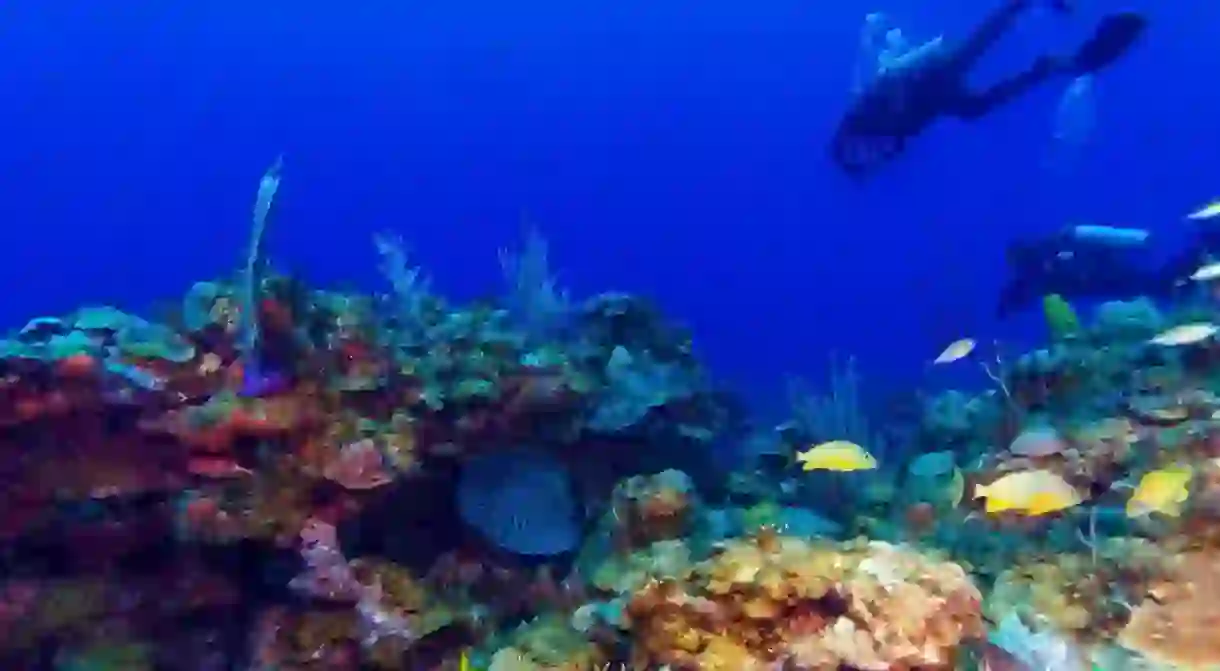The Best Scuba Diving Spots in Cuba

The coastline of Cuba measures 5,745km (3,570mi) long and shelters some of the richest marine life in the Caribbean. Get ready to explore eerie shipwrecks in the Bay of Pigs; dive with sharks at Jardines de la Rey; and spot sea turtles at Cayo Largo – best accessed by yacht.
Get access to the most secluded scuba diving sites by hiring a yacht from SamBoat.
Jardines de la Reina in the Caribbean Sea
Natural Feature

Charge up your GoPro for this thrilling immersion into the world of sharks. In protected waters, five hours’ boat ride off the south coast of Cuba, you’ll dive with dozens of curious silky, nurse, lemon and Caribbean reef sharks that glide over vibrant colourful gardens of elkhorn and staghorn coral, fans and pillars. Bored with the sharks? Eyeball 600 pound Goliath groupers resting on the seabed.
Bay of Pigs in the Gulf of Cazones
Natural Feature

The Caribbean Sea – with its shades of indigo and sapphire – is so beautiful here, it’s no wonder the Castros’ secret holiday home lies nearby. You’ll find the spot on the edge of the Zapata Swamp, 100 miles (160km) southeast of Havana. Clamber over the fretted limestone shore to spot a 1961 invasion wreck in the shallows before heading out to a richly coloured coral wall, some 300m (984ft) deep. Search for sinkholes, black coral, lobster and hawksbill turtles here in the Cazones Gulf.
Punta Francés on the Isla de la Juventud
Natural Feature

Walk the gentle white-sand crescent of Punta Francés, and look for long-gone pirates’ lairs on the ragged limestone coast and American croc nests in the forest before donning your scuba gear. The shimmering turquoise waters of the Bay of Siguanea are remote, found off this southwest sandy spit of the Isle of Youth, 60 miles (96km) off mainland Cuba. The “Pirate’s Coast” shelters 56 dive sites. Keep your eyes peeled for great hammerhead sharks and rays.
Cayo Largo near Cienfuegos
Natural Feature

Cayo Largo is the best destination in Cuba for a diving and sunbathing retreat, boasting some of the most beautiful virgin sands in the Caribbean. Most divers come for the dolphins, groupers, and eagle rays but there are schools of nurse sharks and marine turtles. Hawksbill, green and loggerhead turtles lay their eggs on the coral key beaches. Cayo Largo’s Sea Turtle Rescue Center, open to visitors, protects eggs until hatching time in the autumn months.
María La Gorda on the western tip of Cuba
Natural Feature

Looking for a proper dive scene? This small resort is the only scuba resort of its type on the island. Smart wooden bungalows are set on a palm-strewn, white sand beach. It’s less about the big fish than the plentiful coral, lobster, moray eels, barracuda and a couple of 18th-century shipwreck relics. Most of the dive sites are just offshore or a short boat ride away. This place is perfect for novice divers.
USS Merrimac in Santiago de Cuba
Architectural Landmark
A dramatic naval battle in eastern Cuba left a trail of wrecks on the seabed. In 1898, during the Cuban war of independence from Spain, the Spanish and Americans fought in the Bay of Santiago de Cuba. The US Navy attempted to scuttle the battle-scarred collier USS Merrimac at the entrance to Santiago’s harbour to block the Spanish fleet from escaping. She lies at a depth of 22m (72ft) and measures 98m (322ft) long. Note: you can only dive here on an incoming tide, due to huge amounts of floating sediment in the harbour.
Cayo Guillermo and Cayo Coco in Jardines del Rey
Natural Feature

You’ll love the lo-fi vibe at the resorts on these two sandy keys. Offshore, there’s a lengthy coral reef brimming with parrotfish, snappers, angelfish, barracuda, and turtles. Out of the more than 20 dive sites, you’ll want to explore La Jaula where sharks and rays lurk, Las Coloradas for its caves and tarpons, plus Los Tiburones, famous for its narrow tunnels favoured by reef sharks. After checking out the underwater world, why not learn to kitesurf on the pale sapphire sea?
La Boca in Santa Lucía
Architectural Landmark

Adrenaline junkies, look no further. Off-the-beaten-track but oh-so-worth the journey is the tiny fishing village of La Boca and its gorgeous palm-tree dotted Los Cocos beach. In a small Atlantic channel, a bevy of bull sharks come to feed around a 1905 Spanish galleon wreck. The experience is carefully managed with the Sharks Friends Dive Center where you can get a close-up of these predatory creatures. July to September and February to March are the best times to visit.
This is an updated rewrite of an article originally by Jack Guy.













